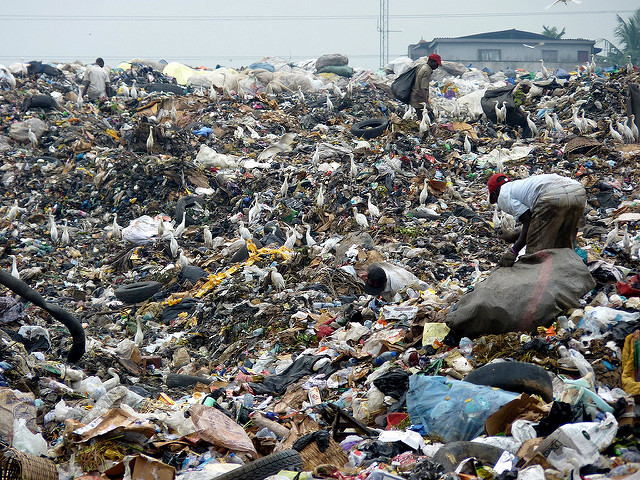Call Us

African Sustainable Waste Management: Tackling the Mountains of Waste
[caption id="attachment_1105" align="alignnone" width="640"] Trash pickers on Lagos landfill [Credit: Rainer Wozny / Heinrich Böll Foundation, via Flickr][/caption] Fueled by population growth and consumerism, the mountains of waste at landfills across the planet just grow and grow. Over a billion tons of waste is generated globally every year. This waste is either buried on landfills, incinerated or recycled and/or exported.
And as landfills get higher and higher, cities are expanding to accommodate their ever growing populations. In many cases landfills were originally sited on the outskirts of cities, but the city’s perimeter has gradually crept further afield. Consequently, landfills that were originally located a healthy distance from residential areas now lie adjacent suburbs that have sprung up on the outskirts of cities.
This not only deflects from the aesthetics of these neighborhoods, it also poses a real health threat to local communities living nearby. Residents may be exposed to atmospheric pollutants released from the site, or their groundwater can become contaminated with pollutants that leach through the soils.
According to a recent Washington Post article that focuses on the issue in the Nigerian port of Lagos, in 2017 the city has had two outbreaks of Lassa fever — a potentially deadly virus that is spread by rats. Improper waste disposal also contributes to higher incidences of malaria and other deadly diseases, such as yellow fever.
Also, there is a growing trend for poorer communities to ‘mine’ landfill sites for waste that can be recycled for profit. It is estimated that the metal and plastic recycling industry in Lagos alone generates around $700 million annually. Yet, while this income opportunity has the potential to generate a healthy livelihood, it is a dangerous and unhealthy occupation.
The Washington Post reports that there are currently more than 4,000 people that work the Olusosun landfill site — the largest landfill in Lagos. They operate from makeshift tents perched on top of the mounds of trash, descending when garbage trucks arrive to dump their load. They then get busily to work, sifting through the waste in search of valuable recyclable materials such as plastic bottles and metal cans.
There is a distinct hierarchy in the informal recycling industry. The trash pickers that scavenge through piles of waste on the Olusosun landfill are low ranking recyclers who provide valuable recyclables to kingpins higher up the chain. The industry also supports entrepreneurs who operate businesses that provide employment or incentives to people in exchange for recycling materials. For example, Wecyclers, a for-profit social enterprise, has a fleet of bicycles and vehicles that collect recyclable materials from households in densely populated areas in and around Lagos.
[caption id="" align="aligncenter" width="512"]
Trash pickers on Lagos landfill [Credit: Rainer Wozny / Heinrich Böll Foundation, via Flickr][/caption] Fueled by population growth and consumerism, the mountains of waste at landfills across the planet just grow and grow. Over a billion tons of waste is generated globally every year. This waste is either buried on landfills, incinerated or recycled and/or exported.
And as landfills get higher and higher, cities are expanding to accommodate their ever growing populations. In many cases landfills were originally sited on the outskirts of cities, but the city’s perimeter has gradually crept further afield. Consequently, landfills that were originally located a healthy distance from residential areas now lie adjacent suburbs that have sprung up on the outskirts of cities.
This not only deflects from the aesthetics of these neighborhoods, it also poses a real health threat to local communities living nearby. Residents may be exposed to atmospheric pollutants released from the site, or their groundwater can become contaminated with pollutants that leach through the soils.
According to a recent Washington Post article that focuses on the issue in the Nigerian port of Lagos, in 2017 the city has had two outbreaks of Lassa fever — a potentially deadly virus that is spread by rats. Improper waste disposal also contributes to higher incidences of malaria and other deadly diseases, such as yellow fever.
Also, there is a growing trend for poorer communities to ‘mine’ landfill sites for waste that can be recycled for profit. It is estimated that the metal and plastic recycling industry in Lagos alone generates around $700 million annually. Yet, while this income opportunity has the potential to generate a healthy livelihood, it is a dangerous and unhealthy occupation.
The Washington Post reports that there are currently more than 4,000 people that work the Olusosun landfill site — the largest landfill in Lagos. They operate from makeshift tents perched on top of the mounds of trash, descending when garbage trucks arrive to dump their load. They then get busily to work, sifting through the waste in search of valuable recyclable materials such as plastic bottles and metal cans.
There is a distinct hierarchy in the informal recycling industry. The trash pickers that scavenge through piles of waste on the Olusosun landfill are low ranking recyclers who provide valuable recyclables to kingpins higher up the chain. The industry also supports entrepreneurs who operate businesses that provide employment or incentives to people in exchange for recycling materials. For example, Wecyclers, a for-profit social enterprise, has a fleet of bicycles and vehicles that collect recyclable materials from households in densely populated areas in and around Lagos.
[caption id="" align="aligncenter" width="512"] Wecycler bicycle returning to recycling depot with load of recycling collected around Lagos [Credit By NdaniTV, via Wikimedia Commons][/caption]These recyclables eventually get shipped off to China where they are melted down and then reused to manufacture plastic or metal products. These products are then exported around the world and the cycle starts all over again.
But while waste recycling addresses the issues of both sustainable waste management and unemployment, this occupation is not without its pitfalls. People have been maimed and even killed by garbage trucks as they eagerly sift through trash in search of recyclables. In order for the waste recycling industry to be a safe and sustainable method of waste management, more consideration needs to be given to the health and safety of people working in the industry, particularly the informal workers such as the trash pickers at the bottom of the hierarchy.
Wecycler bicycle returning to recycling depot with load of recycling collected around Lagos [Credit By NdaniTV, via Wikimedia Commons][/caption]These recyclables eventually get shipped off to China where they are melted down and then reused to manufacture plastic or metal products. These products are then exported around the world and the cycle starts all over again.
But while waste recycling addresses the issues of both sustainable waste management and unemployment, this occupation is not without its pitfalls. People have been maimed and even killed by garbage trucks as they eagerly sift through trash in search of recyclables. In order for the waste recycling industry to be a safe and sustainable method of waste management, more consideration needs to be given to the health and safety of people working in the industry, particularly the informal workers such as the trash pickers at the bottom of the hierarchy.
 Trash pickers on Lagos landfill [Credit: Rainer Wozny / Heinrich Böll Foundation, via Flickr][/caption] Fueled by population growth and consumerism, the mountains of waste at landfills across the planet just grow and grow. Over a billion tons of waste is generated globally every year. This waste is either buried on landfills, incinerated or recycled and/or exported.
And as landfills get higher and higher, cities are expanding to accommodate their ever growing populations. In many cases landfills were originally sited on the outskirts of cities, but the city’s perimeter has gradually crept further afield. Consequently, landfills that were originally located a healthy distance from residential areas now lie adjacent suburbs that have sprung up on the outskirts of cities.
This not only deflects from the aesthetics of these neighborhoods, it also poses a real health threat to local communities living nearby. Residents may be exposed to atmospheric pollutants released from the site, or their groundwater can become contaminated with pollutants that leach through the soils.
According to a recent Washington Post article that focuses on the issue in the Nigerian port of Lagos, in 2017 the city has had two outbreaks of Lassa fever — a potentially deadly virus that is spread by rats. Improper waste disposal also contributes to higher incidences of malaria and other deadly diseases, such as yellow fever.
Also, there is a growing trend for poorer communities to ‘mine’ landfill sites for waste that can be recycled for profit. It is estimated that the metal and plastic recycling industry in Lagos alone generates around $700 million annually. Yet, while this income opportunity has the potential to generate a healthy livelihood, it is a dangerous and unhealthy occupation.
The Washington Post reports that there are currently more than 4,000 people that work the Olusosun landfill site — the largest landfill in Lagos. They operate from makeshift tents perched on top of the mounds of trash, descending when garbage trucks arrive to dump their load. They then get busily to work, sifting through the waste in search of valuable recyclable materials such as plastic bottles and metal cans.
There is a distinct hierarchy in the informal recycling industry. The trash pickers that scavenge through piles of waste on the Olusosun landfill are low ranking recyclers who provide valuable recyclables to kingpins higher up the chain. The industry also supports entrepreneurs who operate businesses that provide employment or incentives to people in exchange for recycling materials. For example, Wecyclers, a for-profit social enterprise, has a fleet of bicycles and vehicles that collect recyclable materials from households in densely populated areas in and around Lagos.
[caption id="" align="aligncenter" width="512"]
Trash pickers on Lagos landfill [Credit: Rainer Wozny / Heinrich Böll Foundation, via Flickr][/caption] Fueled by population growth and consumerism, the mountains of waste at landfills across the planet just grow and grow. Over a billion tons of waste is generated globally every year. This waste is either buried on landfills, incinerated or recycled and/or exported.
And as landfills get higher and higher, cities are expanding to accommodate their ever growing populations. In many cases landfills were originally sited on the outskirts of cities, but the city’s perimeter has gradually crept further afield. Consequently, landfills that were originally located a healthy distance from residential areas now lie adjacent suburbs that have sprung up on the outskirts of cities.
This not only deflects from the aesthetics of these neighborhoods, it also poses a real health threat to local communities living nearby. Residents may be exposed to atmospheric pollutants released from the site, or their groundwater can become contaminated with pollutants that leach through the soils.
According to a recent Washington Post article that focuses on the issue in the Nigerian port of Lagos, in 2017 the city has had two outbreaks of Lassa fever — a potentially deadly virus that is spread by rats. Improper waste disposal also contributes to higher incidences of malaria and other deadly diseases, such as yellow fever.
Also, there is a growing trend for poorer communities to ‘mine’ landfill sites for waste that can be recycled for profit. It is estimated that the metal and plastic recycling industry in Lagos alone generates around $700 million annually. Yet, while this income opportunity has the potential to generate a healthy livelihood, it is a dangerous and unhealthy occupation.
The Washington Post reports that there are currently more than 4,000 people that work the Olusosun landfill site — the largest landfill in Lagos. They operate from makeshift tents perched on top of the mounds of trash, descending when garbage trucks arrive to dump their load. They then get busily to work, sifting through the waste in search of valuable recyclable materials such as plastic bottles and metal cans.
There is a distinct hierarchy in the informal recycling industry. The trash pickers that scavenge through piles of waste on the Olusosun landfill are low ranking recyclers who provide valuable recyclables to kingpins higher up the chain. The industry also supports entrepreneurs who operate businesses that provide employment or incentives to people in exchange for recycling materials. For example, Wecyclers, a for-profit social enterprise, has a fleet of bicycles and vehicles that collect recyclable materials from households in densely populated areas in and around Lagos.
[caption id="" align="aligncenter" width="512"] Wecycler bicycle returning to recycling depot with load of recycling collected around Lagos [Credit By NdaniTV, via Wikimedia Commons][/caption]These recyclables eventually get shipped off to China where they are melted down and then reused to manufacture plastic or metal products. These products are then exported around the world and the cycle starts all over again.
But while waste recycling addresses the issues of both sustainable waste management and unemployment, this occupation is not without its pitfalls. People have been maimed and even killed by garbage trucks as they eagerly sift through trash in search of recyclables. In order for the waste recycling industry to be a safe and sustainable method of waste management, more consideration needs to be given to the health and safety of people working in the industry, particularly the informal workers such as the trash pickers at the bottom of the hierarchy.
Wecycler bicycle returning to recycling depot with load of recycling collected around Lagos [Credit By NdaniTV, via Wikimedia Commons][/caption]These recyclables eventually get shipped off to China where they are melted down and then reused to manufacture plastic or metal products. These products are then exported around the world and the cycle starts all over again.
But while waste recycling addresses the issues of both sustainable waste management and unemployment, this occupation is not without its pitfalls. People have been maimed and even killed by garbage trucks as they eagerly sift through trash in search of recyclables. In order for the waste recycling industry to be a safe and sustainable method of waste management, more consideration needs to be given to the health and safety of people working in the industry, particularly the informal workers such as the trash pickers at the bottom of the hierarchy.


